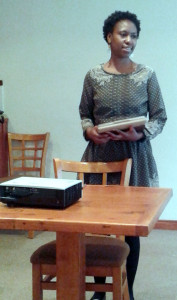The Masicorp Bursary Scheme and its Potential to Support Vocational Education
For the past two months Masicorp has been hosting two masters students from the University of Edinburgh, who were undertaking research work in Masiphumelele as part of their MSc course in International Development. Both students gave their feedback to us last week, and left us with some interesting thoughts on how to further develop our existing programmes.
 First up was Matumelo Wilkin, who although originally from South Africa is currently living with her family in China and studying in Edinburgh. She clearly has an international profile that impressed everyone in Masicorp. We gave Matumelo a project brief based around our existing bursary scheme for higher education, which has successfully helped over thirty Masiphumelele students onto university courses in Cape Town. While the programme has been a big success we are interested in how it could be extended to cover students who may not qualify for, or desire to, undertake the academic style of learning offered at university. We therefore asked Matumelo to examine tertiary education but with a focus on opportunities for vocational livelihoods (i.e. looking at job opportunities that require local college or trade/skills training rather than university level education, e.g. IT technician, plumber, etc.).
First up was Matumelo Wilkin, who although originally from South Africa is currently living with her family in China and studying in Edinburgh. She clearly has an international profile that impressed everyone in Masicorp. We gave Matumelo a project brief based around our existing bursary scheme for higher education, which has successfully helped over thirty Masiphumelele students onto university courses in Cape Town. While the programme has been a big success we are interested in how it could be extended to cover students who may not qualify for, or desire to, undertake the academic style of learning offered at university. We therefore asked Matumelo to examine tertiary education but with a focus on opportunities for vocational livelihoods (i.e. looking at job opportunities that require local college or trade/skills training rather than university level education, e.g. IT technician, plumber, etc.).
Matumelo interviewed many groups of current high school students at the library, and also local businesses to determine if both the desire and demand for vocational training existed in the local area. We were pleased to find that those in the community that knew of Masicorp’s work valued the bursary scheme and in particular the role of the mentors, which were heavily praised by existing bursary students. It seems there will be more of a challenge to increase awareness among students at the high school, with many currently unaware of the bursary opportunity. Currently Masicorp is attracting interest through the friends and family of existing bursary students, who hear about the scheme through word of mouth.
Overall a clear need for vocational education was identified, but Matumelo found that it was not always a well perceived concept within the community. For those students with a desire to undertake further education there is a definite push for university level training, with vocational education often seen as a second best option – or even a failure. Many students were unaware of the term, and believed it is an inferior option for weak students.
 Matumelo also visited several businesses in the industrial parks that surround Masiphumelele, and in most cases identified a willingness to host vocational students on apprenticeship schemes. Her final report has left Masicorp with some ideas about how we could structure and finance a vocational education scheme. Once we have digested this, the challenge will be how best to identify suitable students and give them the appropriate career guidance.
Matumelo also visited several businesses in the industrial parks that surround Masiphumelele, and in most cases identified a willingness to host vocational students on apprenticeship schemes. Her final report has left Masicorp with some ideas about how we could structure and finance a vocational education scheme. Once we have digested this, the challenge will be how best to identify suitable students and give them the appropriate career guidance.
It may be that vocational education courses are more suited to the many students that drop out of formal education for social reasons, rather than those that attend functions at the library and are already engaged in learning programmes. One key issue is that all students need exposure to a variety of professions that will inspire them and encourage vocational training. Many students interviewed by Matumelo were aware of their social realities, and identified various roles they would like to study for (e.g. physchology in response to supporting the many orphaned and abused children in the community).
Overall Matumelo has confirmed a lot of our anecdotal observations and left us with some good ideas on how to take this forward. We thank her very much, and wish her all the best with the final report, which will complete her masters course.

Comments
The Masicorp Bursary Scheme and its Potential to Support Vocational Education — No Comments
HTML tags allowed in your comment: <a href="" title=""> <abbr title=""> <acronym title=""> <b> <blockquote cite=""> <cite> <code> <del datetime=""> <em> <i> <q cite=""> <s> <strike> <strong>